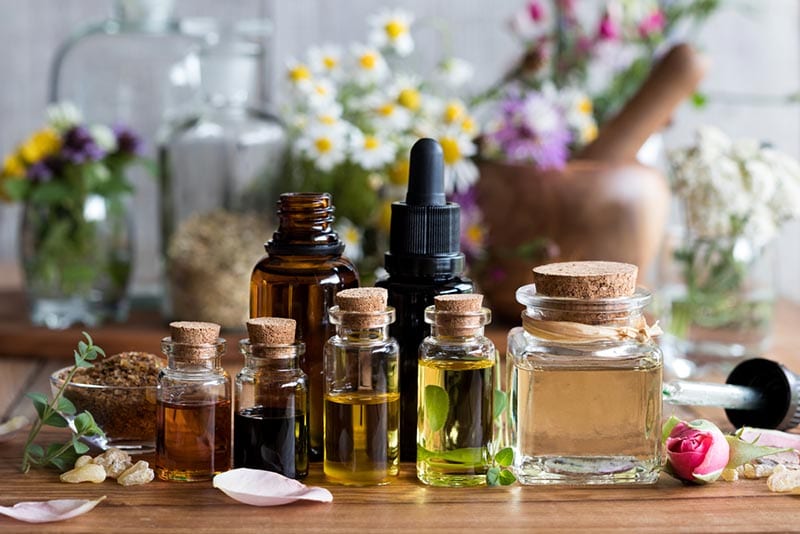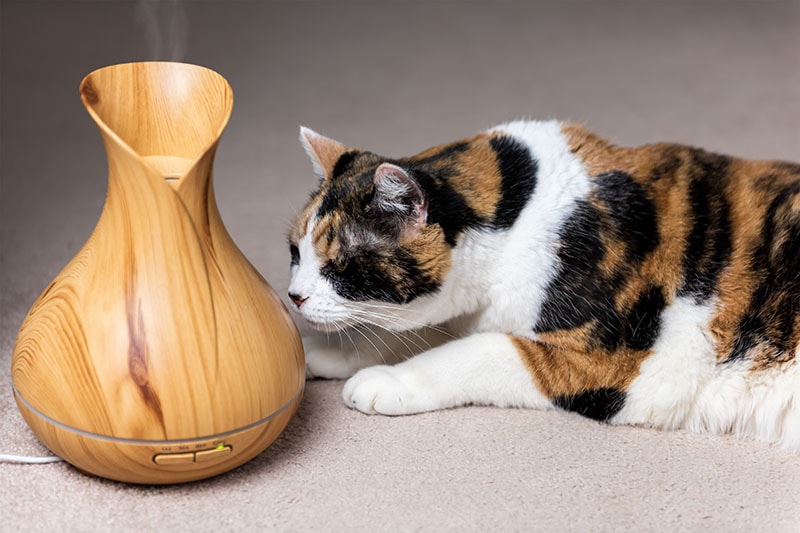
Click to Skip Ahead
Argan oil is often added to personal care products such as moisturizers, conditioners, and shampoos because of its skin and hair-nourishing qualities; it’s also frequently used as a carrier for essential oils.
It’s loaded with healthy nutrients such as omega-6 fatty acids and vitamin E, and you may wonder if it’s safe for your cat. Scientific research into the safety of argan oil use in cats has not yet been done, so it’s best to keep it away from your cat.
Where Does Argan Oil Come From?
Argan oil comes from the Argan tree, native to the southern part of Morocco and Algeria. Technically known as Argania spinosa, Argan trees are drought resistant and help prevent the Sahara desert from expanding due to their deep, water searching roots that have helped bind soil and resist erosion. Argan trees can live for up to 200 years!
Argan oil has traditionally been used to treat skin conditions and reduce aging in humans. It has a rich, nutty flavor and can be used like olive oil. When mixed with almonds and honey, argan oil makes a tasty almond butter. The oil comes from seeds found within the kernel of the tree’s fruit. Goats are particularly fond of eating the fruit of the Argan tree, so they are kept out of plantations. The tree’s wood can be used for fuel or building.

Is Human Shampoo Featuring Argan Oil Safe for Cats?
Many moisturizing shampoos and conditioners made for humans include argan oil, but these products aren’t known to be safe for cats. Felines should only be bathed with products specifically formulated for cats. Most human products are too harsh and acidic for cats; even baby shampoo is not the correct pH for cat skin.
What’s the Deal With Argan Oil and Essential Oils?
Argan oil is frequently used to dilute essential oils. Unfortunately, many essential oils are toxic to cats. Essential oil vapors and infuser droplets can cause respiratory problems in some cats. Droplets can also collect on cats’ skin, and licking them during grooming can make them quite ill. Toxicity can also be caused by essential oils absorbed through cats’ skin.
Cats lack the liver enzymes that break down essential oils, so exposure can quickly become toxic. While it’s generally best to avoid using these products around cats due to the potential for toxicity, some oils are incredibly hazardous, including wintergreen, pine, Ylang-ylang, clove, eucalyptus, and tea tree oils.

Signs of Essential Oil Poisoning
Common signs of essential oil poisoning include drooling, vomiting, lethargy, difficulty breathing, and lack of coordination. Essential oil poisoning is a veterinary emergency. Contact your veterinarian immediately for guidance if you suspect your cat has ingested even a small amount of any essential oil or has managed to get it on their skin or fur. Essential oils used in diffusers can also put cats at risk, especially those with asthma.
Essential Oil Safety
Essential oils should be stored in places that cats can’t get to. Products like tea tree oil should be put in inaccessible cabinets instead of left on bathroom counters. Make sure to only use diffusers in areas with plenty of ventilation, and they should ideally be used when cats aren’t around. Essential oils should never be put directly on cats’ fur or skin.

FAQ’s
Does diet play a role in feline health?
Feeding cats high-quality food that provides all the nutrients they need in the amounts they require is critical to maintaining feline health. Cats who eat nutrient-poor diets often have skin and coat problems. Cats that don’t get enough protein and fat frequently have dull, dry hair amongst other more serious problems.
Those who don’t get sufficient taurine, an essential nutrient, can develop eye and heart problems. Products with a nutritional adequacy statement from the Association of American Feed Control Officials (AAFCO) are designed to be nutritionally complete.
What are some ways to support feline skin health?
Staying on top of flea prevention is an important part of cat ownership and will help to keep a cat’s skin in tip-top shape. Remember that even indoor cats can end up with fleas and other parasites from pets who have access to the outdoors or after encountering visitors who bring along unwanted pests. Speak with your veterinarian before using flea products on your cat to ensure that whatever you select is the right option for your buddy’s needs.
Omega-3 and -6 fatty acids can also provide skin-nourishing benefits. Commercial cat food formulations are available that feature fatty acids and other skin-supporting nutrients but check with your veterinarian before adjusting your cat’s diet to make sure the product you select meets your pet’s specific health and nutritional requirements.
Conclusion
Argan oil is a popular ingredient in many human skin and hair care products. No scientific research has been done on the safety and effectiveness of argan oil when it comes to cats. However, there are several other things you can do to support your cat’s skin health, including ensuring they receive appropriate flea protection and feeding them high-quality cat food that’s full of the right amount of healthy protein and fat. Extra care should be taken in situations when argan oil is used to dilute essential oils, as many of the products are highly toxic to cats.
Featured Image Credit: vovidzha, Shutterstock







